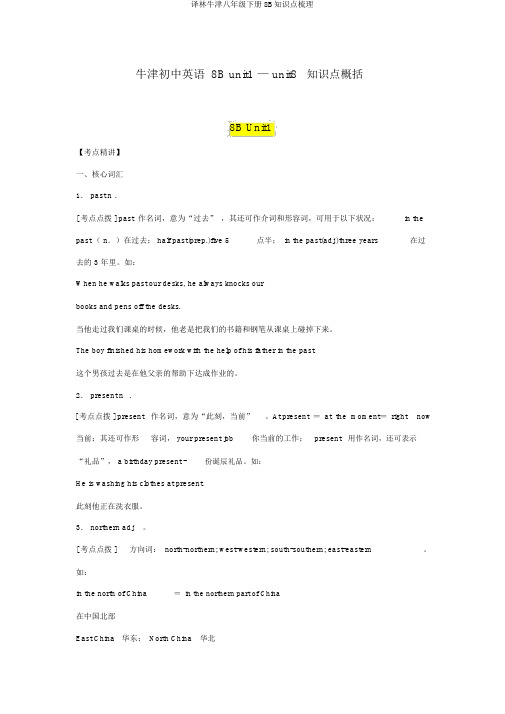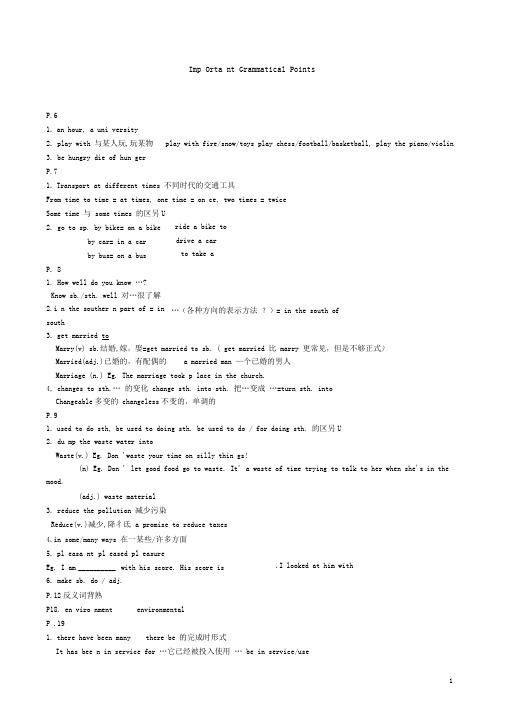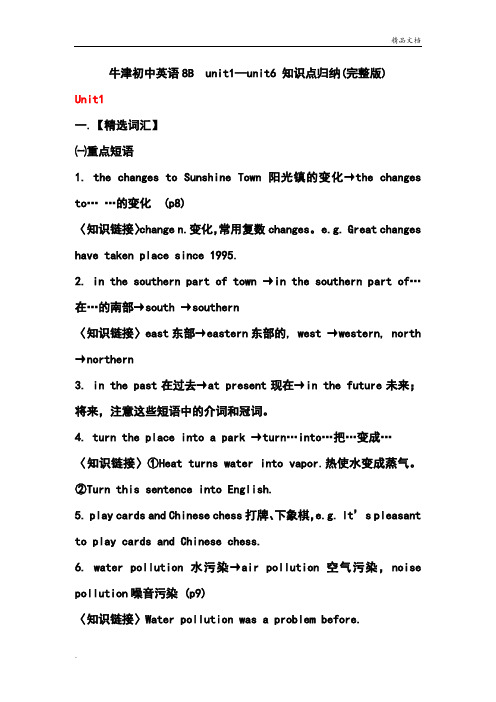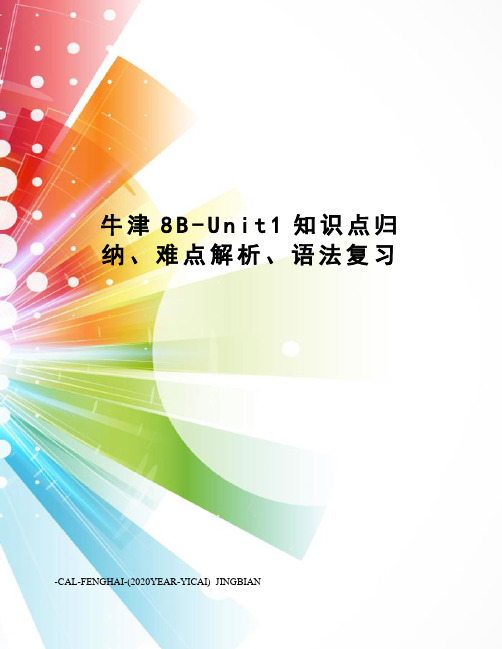牛津8B语法汇总(Unit1-6)
译林牛津八年级下册8B知识点梳理

牛津初中英语8B unit1 — unit8知识点概括8B Unit1【考点精讲】一、核心词汇1. past n .[ 考点点拨 ] past 作名词,意为“过去” ,其还可作介词和形容词,可用于以下状况:in the past ( n.)在过去; half past(prep.)five 5点半;in the past(adj.)three years在过去的 3 年里。
如:When he walks past our desks, he always knocks ourbooks and pens off the desks.当他走过我们课桌的时候,他老是把我们的书籍和钢笔从课桌上碰掉下来。
The boy finished his homework with the help of his father in the past.这个男孩过去是在他父亲的帮助下达成作业的。
2. present n.[ 考点点拨 ] present作名词,意为“此刻,当前”。
At present=at the moment=right now 当前;其还可作形容词, your present job你当前的工作;present用作名词,还可表示“礼品”, a birthday present -份诞辰礼品。
如:He is washing his clothes at present.此刻他正在洗衣服。
3. northern adj。
[ 考点点拨 ]方向词:north-northern; west-western; south-southern; east-eastern。
如:in the north of China=in the northern part of China在中国北部East China华东;North China华北The northern part of the city used to be sparsely populated, but has now become acultural centre.城北过去人口稀罕,但此刻成了文化中心。
牛津英语8B全一册重点短语和句型

Unit1 短语和句型重点短语1. 过去和现在past and present 25. 在过去的世纪里over the past century2. 过去做某事used to do 26. 往返进入镇子travel to and from the town3. 对, 很了解know , very well 27. 另外一个巨大的变化another big change4. 在镇子的北边in the north of town 28. 当地的人民local people5. 在镇子的北部in the northern part of town 29. 从, 返回return from6. 结婚(动作)get married (状态)be married 30. 出国go abroad7. 搬到两个街区外move two blocks away 31. 在小学at primary school8. 自从那时since then 32. 相互保持联系keep in touch with each other9. 变化很大change a lot 33. 主要的交流mainly communicate10. 在这几年里over the years 34. 习惯于做某事be/get used to doing/n.11. 把, 变成, turn , into 35. 生活的变化the changes of life12. 把废料倒进河里put the waste into the river 36. 花费(时间)在某事上spend , on13. 意识到这个问题realize the problem 37. 一张, 近照 a recent picture14. 改善现状improve the situation 38. 狭小的肮脏的街道narrow and dirty roads15. 更干净了much cleaner 39. 大的开阔地large open spaces16. 在某些方面in some ways 40. 在路的两边on the side of the road17. 和之前一样频繁as often as before 41. 有自己的车have one’s own car18. 打牌play cards 42. 到处逛逛go around19. 下中国象棋play Chinese chess 43. 享受舒适的生活enjoy a comfortable life20. 感觉有点孤独feel a bit lonely 44. 家乡的变化①the changes of my hometown21. 有时from time to time②the changes in my hometown 22. 令人新奇的变化the amazing changes③the changes in to hometown23. 他一生中all his life24. 搬到另外一个公寓move to another flat重点句子1. 你也变了。
(完整版)8BUnit1-6语法点

Imp Orta nt Grammatical PointsP.61. an hour, a uni versity2. play with 与某人玩,玩某物 play with fire/snow/toys play chess/football/basketball, play the piano/violin3. be hungry die of hun ger P.71. Transport at different times 不同时代的交通工具From time to time = at times, one time = on ce, two times = twice Some time 与 some times 的区另U 2. go to sp. by bike= on a bikeby car= in a car by bus= on a busP. 81. How well do you know …? Know sb./sth. well 对…很了解2.i n the souther n part of = in south3. get married toMarry(v) sb.结婚,嫁,娶=get married to sb. ( get married 比 marry 更常见,但是不够正式) Married(adj.)已婚的,有配偶的a married man —个已婚的男人 Marriage (n.) Eg. The marriage took p lace in the church.4, changes to sth.… 的变化 change sth. into sth. 把…变成 …=turn sth. into Changeable 多变的 changeless 不变的,单调的 P.91. used to do sth, be used to doing sth. be used to do / for doing sth. 的区另U2. du mp the waste water intoWaste(v.) Eg. Don 'waste your time on silly thin gs!(n) Eg. Don ' let good food go to waste. It ' a waste of time trying to talk to her when she's in themood.(adj.) waste material3. reduce the pollution 减少污染Reduce(v.)减少,降彳氐 a promise to reduce taxes 4.in some/many ways 在一某些/许多方面 5. pl easa nt pl eased pl easureEg. I am __________ with his score. His score is 6. make sb. do / adj. P.12反义词背熟 P18. en viro nment P .191. there have been manythere be 的完成时形式 It has bee n in service for …它已经被投入使用 … be in service/useride a bike to drive a car to take a…(各种方向的表示方法 ?)= in the south of .I looked at him withenvironmental2.n eed to don'n eed to = n eed n'tdo---Must I finish the homework now?---Yes, you must. / No, you n eed n ' don 'have to.P.20 Advantage 优势 ,优点 disadvantage 劣势 ,缺点Bring many advantages 带来许多优点 cause many problems P.23 Tourist attraction = place of interest Attract(v.) sb. 吸引某人 attractive(adj.) 有吸引力的 Attack 攻击 (区别拼写 ) P.24 take you out for a few days p ack (v )打包 It must be fun. 肯定 join sb. in doing sth. 1. 2. 3. 4. P25 1. take sb. out to do sth. a few 和 few 的区别 (n.)背包 package 包,.包裹 must,can,should,may be 否定只能用 can 'tbe Join in 与 join 的区别 2. P . 1. 2. popular tourist attractions attract(v.) attract sb. , sb be attracted by, attraction(n.) symbol sth. which rep rese nts or suggests sth.else 象征 Eg. Sn ake is the symbol of evil. H2O is the symbol of water. Symbolic (adj )象征性的 symbolize (v.) 26-27 fantastic extremely good, wonderful, a fantastic meal 极其丰盛的一餐 fantasy 幻想,胡思乱想 theme park 主题公园 theme the subject of a topic, writing Eg. The theme of this meeting is the solution to the air pollution. 3. 4. 5. 6. move at high speed can 'tstop doing 停不了干某事 can 'thelp doing march across the park march 游行,行进 Eg 。
牛津英语8BUnit1—Unit6_知识点归纳(完整版)

牛津初中英语8B unit1—unit6 知识点归纳(完整版)Unit1一.【精选词汇】㈠重点短语1. the changes to Sunshine Town阳光镇的变化→the changes to… …的变化 (p8)〈知识链接〉change n.变化,常用复数changes。
e.g. Great changes have taken place since 1995.2. in the southern part of town →in the southern part of…在…的南部→south →southern〈知识链接〉east东部→eastern东部的, west →western, north →northern3. in the past在过去→at present现在→in the future未来;将来,注意这些短语中的介词和冠词。
4. turn the place into a park →turn…into…把…变成…〈知识链接〉①Heat turns water into vapor.热使水变成蒸气。
②Turn th is sentence into English.5. play cards and Chinese chess打牌、下象棋,e.g. It’s pleasant to play cards and Chinese chess.6. water pollution水污染→air pollution空气污染,noise pollution噪音污染 (p9)〈知识链接〉Water pollution was a problem before.7. used to dump its wa ste into water →used to do sth过去常做某事,注意否认式、疑问式的形式〈知识链接〉⑴used to do sth →否认式used not to do sth或didn’t use to do sth→疑问式Did sb use to do sth?或Used sbto do sth? ⑵There be和used to合用的形式为There used to be。
牛津8B-Unit1知识点归纳、难点解析、语法复习

牛津8B-U n i t1知识点归纳、难点解析、语法复习-CAL-FENGHAI-(2020YEAR-YICAI)_JINGBIAN8B Unit 1 Past and present【短语学习重点】1.an hour ago 一小时前2.not play with you any more 不再和你一起玩3.not…any more = no more = not … any longer = no longer 不再,再也不……4.in the southern part of town 在南部的镇上5.live together till 1965 住在一起直到1965年6.at different times 在不同的时代7.know the city very well 对这所城市非常了解8.(A and B)get married A和B结婚9. A be married to B A和B结婚(延续)10.move to another flat 搬到另外一所公寓11.in the center of town 在镇中心12.change a lot 变化大13.in the past 在过去14.turn/change the place into a park 变成公园15.at weekends 在周末16.play cards and Chinese chess 打牌,下中国象棋17.a shoe factory 一家鞋厂18.water pollution 水污染19.pollute the river 污染河流ed to do sth 过去常常做某事21.dump its waste into the river 把它的废水倒入河里22.the government realized it was a very serious problem政府意识到它是一个非常严重的问题23.take action to reduce the pollution 采取措施来减少污染24.in some ways 在某些方面25.have open space and pretty gardens拥有开放的空间和漂亮的花园26.move out of …搬出……27.feel a bit lonely 感觉有点孤单28.from time to time/at times 不时/有时29.make me very happy 使得我很开心30.move out of the city 搬出这所城市31.because of +名词因为…..32.be lucky enough to see the changes足够幸运地看到变化33.a few times 几次34.miss my friends 想念我的朋友35.see/enjoy the exhibition 看/喜欢展览36.decide to do sth 决定做某事37.since last week 自从上周以来38.for a whole week 整个一星期39.by the way 顺便说40.hear from her 收到她的来信41.travel by plane 乘飞机旅行42.own a boat 拥有一条船43.in fact 事实上44.in the sitting room 在起居室45.a real one 一个真的46.in service 在服务中47.in the past and the present 在过去和现在48.take me to school 带我去学校49.on my own/by myself/alone 独自/单独50.in primary school 在小学ed to be 过去常常是52.a lot more people 更多的人53.change a lot 改变了许多54.why not do sth 为什么不做某事55.since he was born 自从他出生后56.since last Friday 自从上周五57.move into new flats 搬进新公寓58.over the years 在几年间59.have more free time 有更多的空闲时间60.have time to relax more 有时间多放松【句型学习重点】1.Have you seen my food 你见了我的食物了吗2.I’ve known the place for many years. 我了解这个地方已经许多年了。
牛津英语8B全一册重点短语和句型

牛津英语8B全一册重点短语和句型-CAL-FENGHAI.-(YICAI)-Company One1Unit1 短语和句型重点短语1.过去和现在past and present2.过去做某事 used to do3.对…很了解 know …very well4.在镇子的北边 in the north of town5.在镇子的北部 in the northern part oftown6.结婚(动作)get married (状态)bemarried7.搬到两个街区外 move two blocks away8.自从那时 since then9.变化很大 change a lot10.在这几年里 over the years11.把…变成… turn …into12.把废料倒进河里 put the waste into theriver13.意识到这个问题 realize the problem14.改善现状 improve the situation15.更干净了 much cleaner16.在某些方面 in some ways17.和之前一样频繁 as often as before18.打牌 play cards19.下中国象棋 play Chinese chess20.感觉有点孤独 feel a bit lonely21.有时 from time to time22.令人新奇的变化 the amazing changes23.他一生中 all his life 24.搬到另外一个公寓 move to another flat25.在过去的世纪里 over the past century26.往返进入镇子 travel to and from the town27.另外一个巨大的变化 another big change28.当地的人民 local people29.从…返回 return from30.出国 go abroad31.在小学 at primary school32.相互保持联系 keep in touch with eachother33.主要的交流 mainly communicate34.习惯于做某事 be/get used to doing/n.35.生活的变化the changes of life36.花费(时间)在某事上 spend …on37.一张…近照 a recent picture38.狭小的肮脏的街道 narrow and dirty roads39.大的开阔地 large open spaces40.在路的两边 on the side of the road41.有自己的车 have one’s own car42.到处逛逛 go around43.享受舒适的生活enjoy a comfortable life44.家乡的变化① the changes of my hometown ② the changes in my hometown③ the changes in to hometown重点句子1.你也变了。
牛津英语8B知识点梳理
.牛津<8B>词组、句型语法总结Unit 1 treesI. Phrases动词词组:1. be interested in2. be known as3. be in danger4. breathe pure, cool air5. municate with sb6. keepsb alive and healthy7. know a lot about sth8. protectsb/sth from sth9. protect by sth/doing sth10. read through sth11. releasesth into sth12. taste nasty13. thanksb for sth/doing sth14. warnsb/sth <not> to do sth名词词组:1. average age2. living things3. one another其他词组:as well asII. Sentence Patterns1.What good be sth?2.I suppose that+从句3.Sbbe doing sth these days.Grammer现在进行时1.表示现阶段正在进行着的动作但不一定是说话时正在进行.常和at present〔目前〕、this week〔本周〕、these days〔这几天〕,all the time<一直>等时间状语连用. What lesson are you studying this week?你们本周学哪一课了?〔说话时并不在学〕2.现在进行时有时可用来表示一个在最近按计划或安排要进行的动作即是说可以用来代替将来时,但此时,一般要与表示将来的时间状语连用,而且仅限于少量动词.如:e〔来〕、go〔去〕、leave〔离开〕、arrive〔到达〕、start〔开始〕、return〔返回〕、sleep〔睡觉〕Are you going to Tianjin tomorrow?你明天去##吗?How many of you are ing to the party next week?你们有多少人下周要来参加晚会?.Unit 2WaterI. Phrases动词词组:1. pour into the sink2. sound impatient/puzzled3. add A to B4. carrysb to some place5. clean up6. dropsth into some place7. enjoy the view8. finish with sth9. pumpsth into some place10. speed down the mountain11. run into the Huangpu River12. turn it off13. travel a long way名词词组:1. a water treatment works2. a sewage plant3. a thorough cleaning4. the Yangtze RiverII. Sentence Patterns1.It is + adj + for sb + to do2.It is time <for sb> to do sth3.until/till 直到not … until 直到…才4.What do you mean by sth/doing sth?Grammar:amountsA lot of/lots of/plenty of+可数名词a large amount of +不可数名词a little ,much ,a few ,many,a number of 和the number of 之间的区别Unit 3 ElectricityI. Phrases动词词组:1. be careful with sth2. be connected to sth3. buysth in packets4. changesth into sth5. flow through a wire6. getsbsth = get sth for sb7. lookadj<eg.foolish>8. make electricity9. refer to sth10. scratch one’s head11. think of名词词组:1. a light bulb2. a power station3. a packet of4. heat/movement/light/sound energy5. thin wires介词词组:1. in a way = partly2. on one’s faceII. Sentence Patterns1.Can sb do sth?May sb do sth?Sb must <not> do sth.--Must sb do sth?--Yes, sb must./ No, sb needn’t.2.Sb believe/know/think/tell/wonder/ask + 宾语从句3.If it doesn’t rain tomorrow, We will go for a piic.He wonders if/whether it will rain tomorrow.Grammar:Modal verbs:can/could之间的区别,must/need ,may提问的回答,should,ought to疑问句与否定回答,may be /maybe之间的区别Unit 4 NewspapersI. Phrases动词词组:1. agree to do/ with sb/ on sth2. arrange to do sth3. attend a/the meeting4. be at the meeting5. be responsible for sth6. conclude the meeting7. elect sb to be + 称谓/职位/官衔8. have different ideas9. hold a meeting10. make a list of11. make a decision about sth12. ought <not> to do13. pay for sth14. publish a newspaper15. take charge of = be in charge of16. take notes17. talk over sth18. vote for sb名词词组:1. a pile of2. chief editor介词词组:in one week’s time其他词组:1. soon after2. not any more = no moreII. Sentence Patterns1.--Ought sb to do sth?--Yes, sb ought to do sth./No, sb oughtn’t to do sth2. Sbsuggest that sb <should> do sth.Sbsuggest doing sth.Grammer宾语从句时态;主现从随意、主过从过去,真理永不变语序:陈述语序宾语从句语序特殊情况1.What’s wrong?/What’s the matter?/What’s your trouble?2.Which is the way to…?3.Who引导的特殊疑问句且who做主语,变为宾语从句时,其语序不变.引导词:that ,if、whether,特殊疑问词人称:一随主,二随宾,:第三人称不更新宾从否定前移与缩写宾从反意疑问句代词:it,each/everyUnit 5 magazine articlesI. Phrases动词词组:1. <not> belong to sb2. be happy to do sth3. describesth to sb4. fall down5. go to sleep6. go off7. have a conversation with sb8. hearsb do sth9. keep balance10. keepsth out <eg. keep the smoke out>11. look/watch out12. leadsb to some place13. make sure14.obey the rules15. pull at sb16. save one’s life17. smell smoke18. seem like19. sound like + noun.20. take care of21. taste horrible22. try the phone23. walk into some place名词词组:1. reception desk2. the location of the fire exit3. moments/seconds later介词词组:1. in one’s own words2. against the rules3. during the fire其他词组:as soon asII. Sentence Patterns1.Can I have my key, please?2.It was dead.3.主句+ as soon as/when/before/after + 从句<时态:主将从现>4.Although + 从句,主句5.主句+ because /as/since/now that + 从句Sb/sth + be + so + adj + that + 从句<比较:enough … to do …;too … to do …>6.主句+ so that + 从句7.Safety first!8.Help oneself. Teach oneself. Make oneself at home. Enjoy oneself. Grammar:1. 结果状语从句<1>so…that, such…that, so that 引导.<2>so…that语such...that可以互换.结构:such a/an<形容词>+ 单数名词+that从句such〔+形容词〕+复数可数名词+that从句such〔+形容词〕+不可数名词+that从句so+形容词/副词+that从句so+形容词〔+a/an>+名词+that从句注:So+形容词+a/an+单数可数名词=such +a/an+形容词+单数可数名词<3>如果名词前由many, much, little, few等词修饰时,只能用so, 不用such..2. 比较状语从句1.由as…<形容词副词原级>as, 比较级+ than…等连词引导."比较级+and+比较级〞译为"越来越……〞1. The earth is getting warmer and warmer.地球变得越来越暖和.2."the+比较级…,the+比较级…〞译为"越……就越……〞1. The busier he is, the happier he feels.他越忙就越高兴.3."the+比较级+ of the two〞译为"两个中比较……的〞.1. This watch is the cheaper of the two.这支手表是两个中比较便宜的.3. 目的状语从句〔1〕通常由so that, in order that引导.〔2〕so that既可引导目的状语从句,又可引导结果状语从句.目的状语从句里往往带有情态动词can, could,等.从意思上看,目的状语从句往往表示的目的很明确.<3>so that, in order that可以转换成so as to和in order to简单句.4. 让步状语从句〔1〕由although, though等连词引导.〔2〕although<though>…but…不能用在同一个句子中5 .用too…to…/ so… that改写句子用enough…to/so…that改写句子Unit 6 travelI. Phrases动词词组:1. be excellent insth2. be covered with sth3. be an hour away from4. be similar to5. sth be familiar to sb = sb be familiar with sth6. be famous for/ be known as7. enablesb to do sth8. further one’s studies9. go abroad10. go for a holiday11. remindsb of sth12. spread one’s wings13.try doing sth/ to do sth14. used to do sth/be used to doing sth/be used to do sth名词词组:1. French Film Festivals2. language schools3. mountain regions4. rows of5. scenic areas6. tree-lined streets7. the influence of sb/sth8. the world’s top designer names9. the Atlantic Ocean10. the capital of France11. The Channel Tunnel介词词组:1. all over the world = throughout the world2. from … to3. in addition = besides/what’s more4. in some ways5. in art and culture其他词组:1. the same + noun + as2. such as + nounII. Sentence Patterns1.Now that + 从句,主句2.It is + adj + to do sth3.Why not do sth? = Why don’t you do sth? = What about doing sth?Grammar:连词就近原则:not only...but also..., or, either...or..., neither...nor... ,there be …,not…but…就远原则:as well as,together withBoth+不可数and+不可数谓语用复数Unit 7 poemsI. Phrases动词词组:1. be cross2. be scared3. be pleased with sth4. be puzzled by5. chat with sb6. sb be bored with sth/sth be boring to sb7. feel like doing sth8. findsth interesting9. go to sleep/bed10. have a shower11. pay attention <to>12. putsb in detention13. sit in a chair介词词组:1. on one’s own2. on the building siteII. Sentence Patterns1.--Whose friend is sb?--Sb is one’s/mine/yours/his/hers/theirs.2. There is sb doing sth3. I would like to do sthGrammar:疑问代词whose"谁的〞对名词性物主代词和形容词性物主代词提问Who’s=who is 对某人提问One、ones,One代替前面已经出现过的单数可数名词,以避免重复Ones一般指代前面已经出现过的复数可数名词It/one都可指代前面提到的名词,但it代替的是前面提到的那件特指的事物,而one所指代的是前面提到的同类事物,但不是同一件.。
牛津译林版8B语法知识点汇总
牛津译林版8B语法知识点汇总Unit 1词组:1和…玩play with sb2不再…not…any more3不同时期的交通工具transport at different times4阳光镇的变化the changes to Sunshine Town5非常了解这个地方know the place well 6从那时起since then7自从2005年以来since20058自从去年以来since last year9自从三个星期前以来since three weeks ago10搬家move house11搬到南京move to Nanjing12搬进一座新公寓move to/into a new flat13在…南部in the southern part of14结婚get married15和某人结婚be/get married to sb/marry sb16变化很大change a lot17在过去in the past18在现在at present19这些年以来over/during the years20把…变成…turn…into…21在周末at weekends22打牌play cards23下中国象棋play Chinese chess24愉快的假期pleasant holiday25玩得很开心have a pleasant time26水污染water pollution27噪音污染noise pollution28过去经常做某事used to do sth29像以前一样经常地…as often as before 30把…排进/倒进…dump…into…31一个很严重的问题a very serious problem32采取行动做某事take action to do sth33减少污染reduce the pollution34在某种程度上in some ways35顺便问一下by the way36在去…的路上on the way to…37挡路in the way38开阔的空间/户外活动场所open space 39不时地,偶尔from time to time40从…搬出去move out of…41事实上,实际上in fact42一处自然景点地方a place of natural beauty43一个新的火车站a new railway station 44从…借…borrow sth from sb45借给某人…/把…借给…lend sb sth=lend sth to sb46例如for example/such as47在使用中be in use=be in service48带…去…take sb to…49一所小学a primary school50我也是Me,too.51独自地on one’s own=by oneself=alone 52空余时间free time53有同感have the same feeling54青山环绕green hills around55清新的空气fresh air56良好的环境a good environment57发展缓慢less development58离…远be far(away)from59离…近be close to…60给…造成许多麻烦cause many problems for…61近期照片recent photos62在近几年中in recent years63…的反义词the opposite of…64有好运have good luck65把…扔掉throw sth away66一个真正的问题a real problem67写一篇有关阳光镇的文章write an article on Sunshine Town68在过去的一个世纪over the past century69关于北京的过去和现在about Beijing’s past and present70感冒have a cold71患重感冒have a bad cold72受到某人的来信hear from sb=receive a letter from 73乘飞机旅行travel by plane/by air 74享受阳光和沙滩enjoy the sun and the beach语法:现在完成时(I)我们用现在完成时表示从过去持续到现在的动作或状态,或已完成但对现在有一定影响的活动。
译林牛津八年级下册 8B知识点梳理
牛津初中英语8B unit1—unit8 知识点归纳8B Unit1【考点精讲】一、核心词汇1.past n.[考点点拨]past作名词,意为“过去”,其还可作介词和形容词,可用于如下情况:in the past(n.)在过去;half past(prep.)five 5点半;in the past(adj.)three years在过去的3年里。
如:When he walks past our desks, he always knocks ourbooks and pens off the desks.当他走过我们课桌的时候,他总是把我们的书本和钢笔从课桌上碰掉下来。
The boy finished his homework with the help of his father in the past.这个男孩过去是在他父亲的帮助下完成作业的。
2.present n.[考点点拨]present作名词,意为“现在,目前”。
At present=at the moment=right now 目前;其还可作形容词,your present job你目前的工作;present用作名词,还可表示“礼物”,a birthday present -份生日礼物。
如:He is washing his clothes at present.现在他正在洗衣服。
3.northern adj。
[考点点拨] 方位词:north-northern; west-western; south-southern; east-eastern。
如:in the north of China = in the northern part of China在中国北部East China华东;North China华北The northern part of the city used to be sparsely populated, but has now bee a cultural centre.城北过去人口稀少,但现在成了文化中心。
(完整版)新版牛津译林8BU1知识点.docx
8BU1 知点1、 in the past 在去n.past prep.sixteen past eight8:16sixteen to eight7:44walk past the house走房子同音: passed pass 的去式pass the letter to me把信我2、 at present目前;在= at the momentpresent 礼物many presents 多礼物3、 just now 才(一般去式状)4、used to do sth. 去常常做某事I used to go to school by bus.我去常常坐公去学校be/get used to doing sth.于做某事I am used to living here now.我在已住在里了。
be used to do/for sth. 被用来做某事Pen is used to write. 笔是用来写的。
5、east西 west 南 south 北 north6、 marry v. 婚 (短性 )marriage n.婚姻和某人婚marry sb.get married to sb.注意区: They have got married. 他婚了。
They have been married for 10 years. 他婚 10 年了。
7、 wolf狼复数: wolveswife — wives8、 over ①在⋯⋯期over the 10 years 在 10年②超He is over 30 years old.他超 30 了。
③从一到另一jump over the chair跳椅子9、on开(器)turn on the TV Open 打开;开着的open the dooroff关(器)turn off the lightkeep the door open close 关;密的close the doorup音量高;出turn up the radio keep the door closedturn close friends down音量低;拒turn down the radiointo 成turn the place into a park10、 pollution n.[U]染much pollutionpollute v. 染pollute the river染小河a polluted river一条被染的小河11、 waste n.[U] 物too much wastev.浪waste time 浪waste water 浪水12、 realize one’s dream 某人的梦想realize my dream 我的梦想n.realization 意13、 improve v. 提高 ;改善n. [C]improvementimprove the environment改善境14、in one’s way 某人的路;妨碍Don’tbe in my way.不要妨碍我。
- 1、下载文档前请自行甄别文档内容的完整性,平台不提供额外的编辑、内容补充、找答案等附加服务。
- 2、"仅部分预览"的文档,不可在线预览部分如存在完整性等问题,可反馈申请退款(可完整预览的文档不适用该条件!)。
- 3、如文档侵犯您的权益,请联系客服反馈,我们会尽快为您处理(人工客服工作时间:9:00-18:30)。
(UNIT1)现在完成时的重点和难点一、现在完成时的“完成用法”和“未完成用法”1.现在完成时的"完成用法"现在完成时的"完成用法"指的是动作发生在过去某一时刻并已结束,但该动作对现在产生了影响,与现在情况具有因果关系。
例如:He has turned off the light.他已把灯关了。
(动作结束于过去,但说明的是现在的情况--灯现在不亮了。
)现在完成时"完成用法"的特点是动作不延续,因此,该时态只能与表示不定的过去时间状语(如:already,yet,before,recently等)、频度时间状语(如:never,ever,once等)、包括现在时刻在内的时间状语(如:this morning /month /year...,today等)连用。
例如:Have you found your pen yet?你已找到你的钢笔了吗?2.现在完成时的"未完成用法"现在完成时的"未完成用法"指的是动作开始于过去某一时刻,一直延续到现在,或可能还要继续下去。
例如:He has lived here since 1978.自从1978年以来,他一直住在这儿。
(动作起始于1978年,一直住到现在,可能还要继续住下去。
)I have been in the army for more than 5 years.我在部队已经呆了五年多了。
(动作开始于5年前,一直延续至今,有可能还要继续下去。
) 此种用法的句中常需一个表示一段时间的状语(由since或for引导),或表示与现在时刻相连的时间状语(如:up to now,so far到目前为止)等。
例如:I have heard nothing from him up to now.到目前为止我没有他的任何消息。
注意:(1)现在完成时的未完成用法只适用于延续性动词,不可用于终止性动词,即瞬间完成或延续时间很短的动词。
如:come,go,arrive,leave,join,become,die等。
(2)现在完成时常见两种句型:①主语+have / has been+for短语②It is+一段时间+since从句例如:He has been in the League for three years.或It is three years since he joined the League. 他入团已三年了。
3、延续性动词和终止性动词的概念英语中,动词按其动作发生的方式、动作发生过程的长短,可分为延续性动词和终止性动词。
延续性动词表示能够延续的动作,这种动作可以延续下去或产生持久影响。
如:learn, work, stand, lie, know, walk, keep, have, wait, watch, sing, read, sleep, live, stay等。
终止性动词也称非延续性动词、瞬间动词或短暂性动词,表示不能延续的动作,这种动作发生后立即结束。
如open, close, finish, begin, come, go, arrive, reach, get to, leave, move, borrow,buy等。
4、延续性动词的用法特征1.延续性动词可以用于现在完成时,其完成时态可与表示"段时间"的状语连用。
表示"段时间"的短语有:for two years, during the past three years, since last year, how long等。
如:I have learned English since I came here.自从我来到这儿就学英语了。
2.延续性动词不能与表示短暂时间的"点时间"状语连用。
如:It raind at eight yesterday morning.(误) rain为延续性动词,而at eight表示"点时间",前后显然矛盾。
如果用延续性动词表示一瞬间的动作,可以借助come, begin, get等终止性动词来表示。
上句可改为:It began to rain at eight yesterday morning.(正)又如:-When did you get to know Jack?-Two years ago.-Then you've known each other for more than two years.-That's right.5、终止性动词的用法特征1.终止性动词可用来表示某一动作完成,因此可用于现在完成时。
如:The train has arrived.火车到了。
Have you joined the computer group? 你加入电脑小组了吗?2.终止性动词表示的动作极其短暂,不能持续。
因此,不可与表示一段时间的状语连用(只限肯定式)。
如:(1)他死了三年了。
误:He has died for three years.正:He has been dead for three years. 正:He died three years ago.正:It is three years since he died. 正:Three years has passed since he died.(2)他来这儿五天了。
误:He has come here for five days.正:He has been here for five days. 正:He came here five days ago.正:It is five days since he came here. 正:Five days has passed since he came here.(1)、(2)句中的die、come为终止性动词,不能与表示"段时间"的状语连用。
那么,应如何正确表达呢?可以采用下面的四种方法:(1)将句中终止性动词转换为相应的延续性动词,如上面两例中的第一种正确表达方式。
下面列举几例:leave→be away, borrow→keep, buy→have, begin/start→be on, die→be dead, move to→live in, finish→be over, join→be in/be a member of, open sth.→keep sth. open, fall ill→be ill, get up→be up, catch a cold→have a cold。
(2)将句中表示"段时间"的状语改为表示过去确定时间的状语,如下面两例中的第二种正确表达方式。
(3)用句型"It is+段时间+since..."表达原意,如上面两例中的第三种正确表达方式。
(4)用句型"时间+has passed+since..."表达原意,如上面两例中的第四种正确表达方式。
3.终止性动词可用于现在完成时否定式中,成为可以延续的状态,因而可与表示一段时间的状语连用。
如:He hasn't left here since 1986.I haven't heard from my father for two weeks.4.终止性动词的否定式与until/till连用,构成"not+终止性动词+until/till ..."的句型,意为"直到……才……"。
如:You can't leave here until I arrive.直到我到了,你才能离开这里。
I will not go to bed until I finish drawing the picture tonight.今天晚上直到我画完画,我才上床睡觉。
5.终止性动词可以用于when引导的时间状语从句中,但不可以用于while 引导的时间状语从句中。
when表示的时间是"点时间"(从句谓语动词用终止性动词),也可以是"段时间"(从句谓语动词用延续性动词)。
而while表示的是一个较长的时间或过程,从句谓语动词用延续性动词。
如:When we reached London, it was twelve o'clock. (reach为终止性动词)Please look after my daughter while/when we are away. (be away为延续性动词短语)6.终止性动词完成时不可与how long连用(只限于肯定式)。
如:误:How long have you come here? 正:How long have you been here?正:When did you come here?二、现在完成时与一般过去时的区别1. 一般过去时表示过去某个时间发生的事、存在的状态或经常发生的动作。
说话的侧重点只在于陈述一件过去的事情,不强调对"现在"产生的影响。
如:He visited Guilin in 1998.他1998年参观过桂林。
(只说明去桂林的时间)2. 现在完成时表示动作发生在过去,对现在造成了影响或产生了结果。
不与确定的过去时间状语连用。
如:Jill has bought a new computer.吉尔买了一台新电脑。
(着重点是现在有了一台新电脑)3. 两种时态的区分(1)一般过去时的谓语动词用过去式,而现在完成时的谓语基本构成是"助动词have /has +过去分词"。
如:The film started at 7 o’clock. He has been a teacher for many years.(2)一般过去时通常与表示过去的时间状语连用。
如:yesterday, last week, two years ago, just now, in 2002等;而现在完成时则常与just, already, ever, never等副词和these days, this week, since..., for...等表示一段时间的状语连用。
看看以下的几组句子,有什么区别?① Have you seen the film?(A) Did you see the film?(B)[说明] 你看过这部电影吗?(A)句强调的是被问者对剧情是否了解;(B)句强调的是看这部电影的动作是否发生过,并不强调是否知道其内容。
